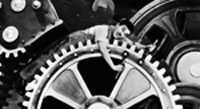The Advent of Artificial Intelligence and the Future of Work
Every generation has seen changes that affect all layers of society. We’re about to experience one of those phases with automation and artificial intelligence.

Our grandparents witnessed the automation of production lines and the disappearance of draft horses. We witnessed the computerization of the work environment, the introduction of databases where everything is captured, and the disappearance of some administrative tasks.
The next revolution will affect all occupations that have some repetitive and simple tasks. More than 700 fields of work were reviewed in The Future of Employment, a report by C.B. Frey and M. Osborne, to determine the level of impact automation will have in the workplace [https://www.oxfordmartin.ox.ac.uk/downloads/academic/The_Future_of_Employment.pdf]. The accountants who do our income tax are gradually being replaced with software programs and online applications. Jobs such as bookkeeper, finance clerk, auditor and procurement officer could soon disappear.
All areas associated with customer service will also be affected. Just think of online ordering apps and the automated checkouts we see popping up in stores. Also coming out are consultation, diagnosis and prescription services, assisted by smart watches that collect biometrics. Inspection and approval jobs (veterinarians, food industry) as well as support technicians will also be affected by tools that help with visual analysis, handling and detection of product quality.
Software and hardware engineering, which have increasingly become fields where things are copy-pasted from the past, will also be impacted by the introduction of automation and solution development tools. App Shells to create Web and mobile solutions are already here. Artificial intelligence is being used more and more to develop plans and specifications for buildings, ships and planes.
PIPSC is obviously concerned about the impact these changes will have on its members in the coming years. Could we be on the cusp of an economic crisis with major job losses, or of becoming a more socialistic society? We have joined with our union partners to launch a research project in order to understand these repercussions, and see what we can do to prepare for them. We will need to think of solutions, like bolstering training programs in our collective agreements, overhauling provisions on technological changes and, of course, reducing outsourcing to promote the development of expertise and new technologies internally.
Look at your own duties, and think about what it would be like if 50% of them were removed. What could you do in the future that would be of value to your employer? Explore and prepare yourself in that direction.
We all need to do our part to arm ourselves for the future.
Humans will become the next unemployed horses (L’être humain : le prochain cheval mis au chômage) :https://www.youtube.com/watch?v=7Pq-S557XQU
Stéphane Aubry, PIPSC Vice-President

